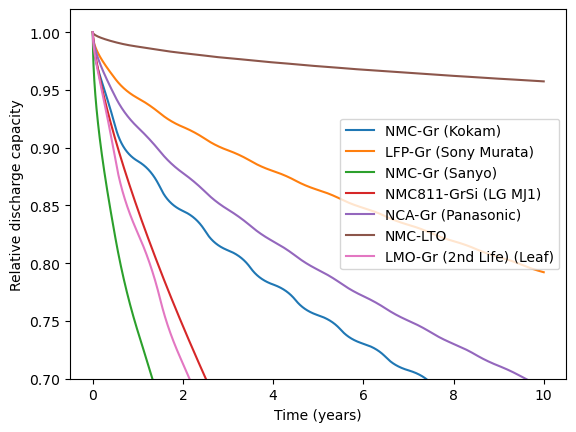|
|
||
|---|---|---|
| matlab | ||
| python | ||
| NOTICE.txt | ||
| README.md | ||
| SWR-22-69.docx | ||
| example_battery_life.png | ||
| license.txt | ||
README.md
BLAST-Lite
Battery Lifetime Analysis and Simulation Toolsuite (BLAST) provides a library of battery lifetime and degradation models for various commercial lithium-ion batteries from recent years. Degradation models are indentified from publically available lab-based aging data using NREL's battery life model identification toolkit. The battery life models predicted the expected lifetime of batteries used in mobile or stationary applications as functions of their temperature and use (state-of-charge, depth-of-discharge, and charge/discharge rates). Model implementation is in both Python and MATLAB programming languages. The MATLAB code also provides example applications (stationary storage and EV), climate data, and simple thermal management options. For more information on battery health diagnostics, prediction, and optimization, see NREL's Battery Lifespan webpage.
Caveats
These battery models predict 'expected life', that is, battery life under nominal conditions. Many types of battery failure will not be predicted by these models:
- Overcharge or overdischarge
- Impact of physical damage, vibration, or humidity
- Operating outside of manufacturer performance and environmental limits, such as voltage, temperature, and charge/discharge rate limits
- Pack performance loss due to cell-to-cell inbalance
Aging models are generally trained on a limited amount of data, that is, there is not enough information to estimate cell-to-cell variability in degradation rates. Battery 'warranty life' is generally much more conservative than 'expected life'.
Citations:
- Sony Murata LFP-Gr battery aging data and model
- Nissan Leaf LMO-Gr (2nd life cells) battery aging data
- [Calendar aging data source] (https://doi.org/10.1109/EEEIC/ICPSEUROPE54979.2022.9854784)
- [Cycle aging data source] (https://doi.org/10.1016/j.est.2020.101695)
- Panasonic NCA-Gr battery aging data
- Commercial NMC-LTO battery aging data source
- Kokam NMC111-Gr battery aging data source
- Sanyo NMC111-Gr battery aging model source
- LG MJ1 NMC811-GrSi battery aging data source
- Stationary storage battery use profiles are provided open-source by Kucevic et al
- Electric vehicle battery use profiles were generated using NREL's FASTSim tool.
Authors
Paul Gasper, Kandler Smith
NREL SWR-22-69
